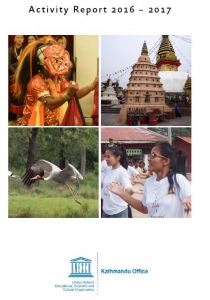
This report summarises the work and achievements accomplished in the fields of education, culture, natural sciences and communication and information by the Office in 2016 and 2017, in response to the main development issues and challenges facing Nepal. Activities have been undertaken in support of the implementation of the national priorities and strategies outlined in the United Nations Development Assistance Framework (UNDAF) 2013-2017 for Nepal, and the Sustainable Development Goals (SDGs). The activities were implemented in accordance with the strategies and timeframe of the UNESCO Approved 38 c/5 Programme and Budget. In the area of Education, the Office continued its work with the government, development partners, nongovernment organisations, civil society organisations and youth representatives to support national efforts towards achieving the Education 2030 agenda (Sustainable Development Goal 4 on Quality Education) through more efficient strategic planning and management, including technical support for preparing Nepal’s Education 2030 Vision Document and the School Sector Development Plan. In the area of Culture, the Office’s strategy focused on restoration of Nepal’s cultural heritage, damaged by the 2015 earthquakes, and building the capacity of national and local stakeholders to protect and safeguard both, tangible and intangible cultural heritage. A key focus has also been strengthening the conservation and management of Lumbini, the birthplace of Lord Buddha, and coordinating efforts for the protection of the Greater Lumbini Area. The Natural Sciences unit has been working on projects related to reducing pollution levels in coordination with the Government of Nepal. The work of Communication and Information included promoting freedom of expression, media development and advocating for the rights and safety of journalists. The Office provides advice and capacity building to stakeholders on these issues, paying special attention to the challenges and aspirations of women journalists. Communication, information and knowledge are the driving forces of sustainable development and the Office is committed to the Sustainable Development Agenda 2030, adopted by the international community in 2015. The Office was actively involved in the preparation of the forthcoming UNDAF, and was able to ensure that education, culture and media were duly reflected in the document.
